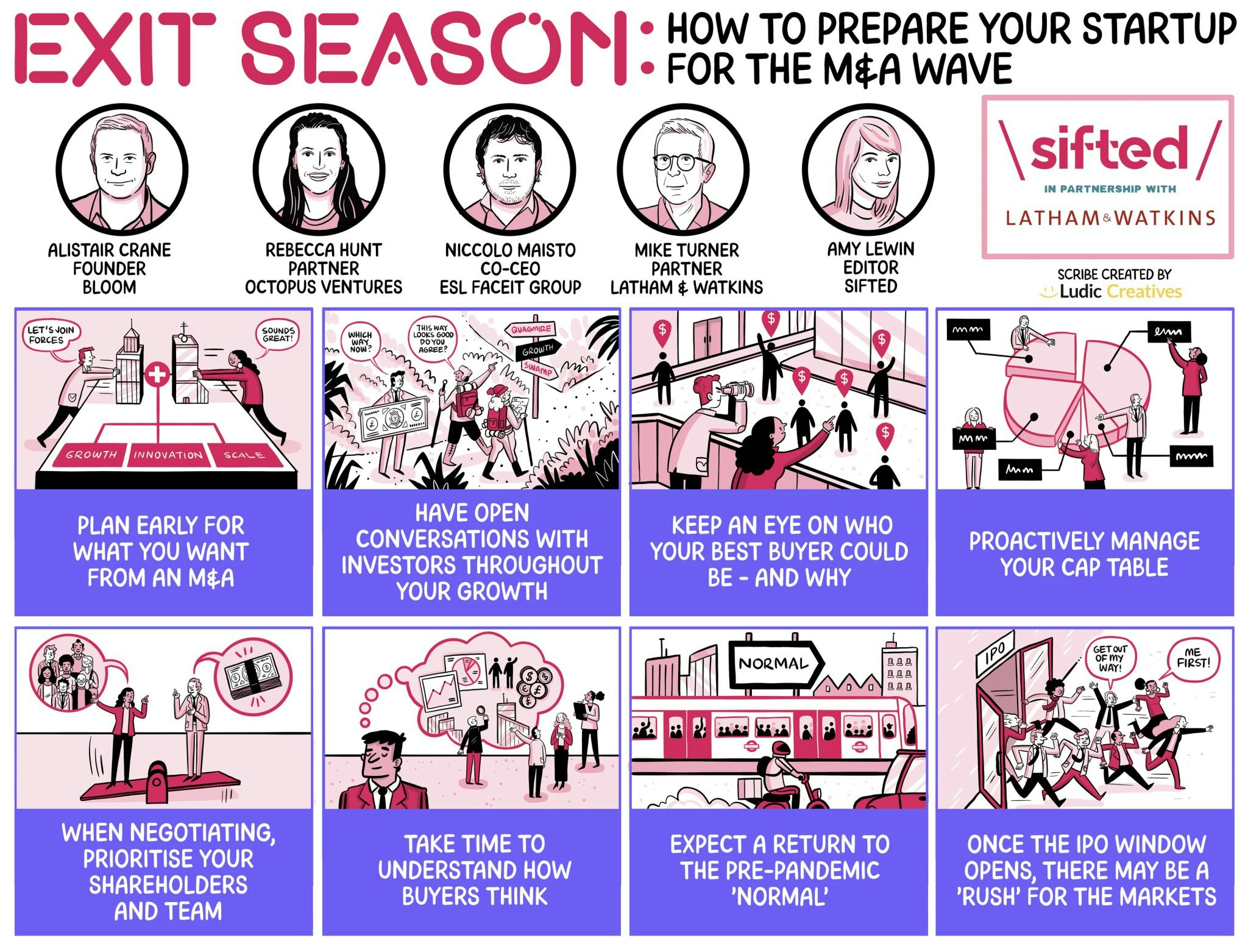Up to August last year, the M&A market remained noticeably subdued — with deal volume down 14% year-on-year.
But this dip is expected to take a U-turn later this year, offering startups with potentially fruitful opportunities that haven’t been as easy to come by since the pre-pandemic era.
In our latest edition of Sifted Talks, we explored how to prepare your startup for the expected M&A surge, Our speakers were:
- Rebecca Hunt, partner at Octopus Ventures, a VC based in London;
- Mike Turner, partner at Latham & Watkins, a global law firm headquartered in London;
- Alistair Crane, founder of Bloom, a professional coaching platform;
- Niccolo Maisto, founder of ESL FACEIT Group, a gaming community.
Here are the key takeaways from the panel:

1/ Plan early for what you want from an M&A
Having open conversations with investors is key. Crane notes that it’s a healthy measure for founders to have an understanding of the support available from investors for the space they are operating in, as well as their appetite to keep deploying capital.
Crane says working with investors to get a feel for the market and conducting due diligence of businesses of interest — both for those looking to acquire or wanting to be acquired — means that should an opportunity arise, you are ready to take the leap straightaway.
“We don't tend to get drawn into the speculative,” says Crane. “We follow a shortlist of companies that we've been impressed by but think might be capital constrained and struggling to raise if they haven't hit their numbers. If those names appear, they trigger immediate action from the team.”
“Become more prevalent [in your space] and even if you don't go ahead and make the acquisition or merger, it's a really good way of finding out who's got deeper pockets and who's following your journey closely and believing in the mission.” – Alistair Crane, Bloom
2/ Have an eye on who your best buyer could be — and why
Hunt says when she’s thinking about an exit for a business, the best businesses are bought and not sold.
“It's very, very rare — especially in the VC world — that a business with three to six months of cash can find a good home for their business, or a good upside return for any of their investors,” says Hunt. “As you're navigating the growth of the business, always have one eye on who the people are that may eventually want to buy the business [and build] relationships with those people.”
Hunt adds that it’s important to understand why they might want to buy your business — and it often isn’t for the most obvious reason. You could assume an acquirer is buying your business for the revenue, for example, but they want the operation because of its brand.
Maisto agrees, noting how his business had fostered relationships with all the exit opportunities that came FACEIT’s way years beforehand.
“Having an understanding of what matters to which buyers so you can navigate conversations and positioning with those buyers in the right way is super important.” – Rebecca Hunt, Octopus Ventures
3/ Proactively manage your cap table
Turner said in 2021, every investor who came to the cap table saw their hold period — the amount of time for which they were invested in a particular company — as three to five years, but that's now changed.
Now, he says, there’s a lot more tension in the cap table where you have early-stage investors who have been holding for a very long period of time, and founders must proactively manage this.
“There's no right way of doing it, but there's lots of wrong ways of doing it,” says Turner. “Making sure that everybody is as aligned as they can be, understanding what their hopes and aspirations are, and informing them of who is out in the market, what the opportunities are, why you think now is the right or the wrong time to go to market, [is key].”
“Founders should be speaking to their investors, and not just the latest round investor — [it needs to be] right through the cap table to make sure everyone is as aligned as they can be in this market.” – Mike Turner, Latham & Watkins
4/ When negotiating, prioritise your shareholders and team
As you finalise the finer details of an acquisition or merger, Crane strongly recommends keeping your shareholders and team at the forefront of all negotiations — and this helps longer term founder reputation, too.
“My job starting businesses is so much easier now because I have lots of phenomenal ex-colleagues who have had good outcomes — whether it be for career trajectory or financially,” he says. “[This means it’s] much easier to bring them in on new opportunities or get them as good reference points to introduce new members to whatever you're building.”
“The business wouldn't have started without shareholder involvement in the first place, so you have to make sure that they get well looked after.” – Crane
5/ Take time to understand how buyers think
Maisto notes the importance of having full comprehension about how a buyer may approach an M&A deal with your company and what their priorities might be but added that not every company is the same, so there is some nuance in how the process may unfold.
“I've seen situations where someone felt that the deal was done with a term sheet — but remember, until you have a long form or, even worse, until you have money in the bank, the deal is not actually done,” says Maisto.
Turner agrees, noting that engagement with a buyer is essential throughout the final stages of a deal.
“Understanding how the counterparty works, what the decision process looks like, and what different people can input to the decision process is extremely important.” – Maisto, ESL FACEIT Group
6/ Expect a return to the pre-pandemic ‘normal’
Hunt believes that the expected uptick in M&A activity is a signal that things are returning to normal — like that of the pre-pandemic era — rather than being the start of something new.
She says her expectation is that the increase in activity will become steady, with a consistent flow of listings, post-listing good performance and private M&A.
“I think [M&A activity will be] going back to normal, rather than any huge spike in activity — which will feel like a spike from the last two to three years, where it's been very quiet,” says Hunt.
Turner agrees but added that once the IPO window does open, there will likely be a ‘rush’ for the markets.
“There are a huge number of IPOs waiting to happen. It [could] be a rollercoaster for the next 12 to 18 months.” – Turner
Like this and want more? Watch the full Sifted Talks here:





